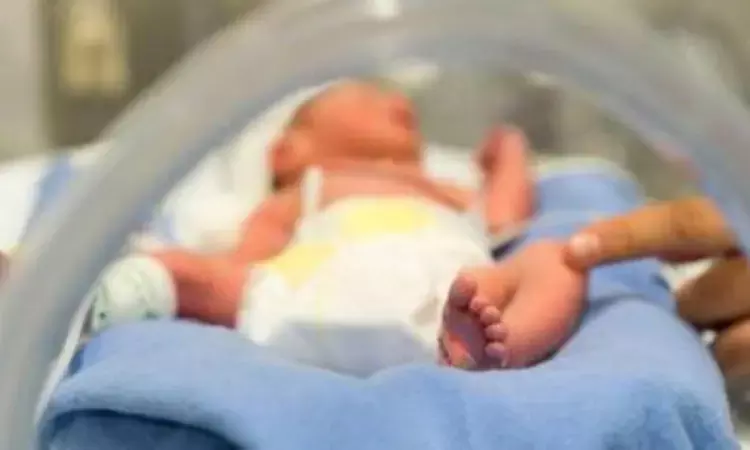- Home
- Medical news & Guidelines
- Anesthesiology
- Cardiology and CTVS
- Critical Care
- Dentistry
- Dermatology
- Diabetes and Endocrinology
- ENT
- Gastroenterology
- Medicine
- Nephrology
- Neurology
- Obstretics-Gynaecology
- Oncology
- Ophthalmology
- Orthopaedics
- Pediatrics-Neonatology
- Psychiatry
- Pulmonology
- Radiology
- Surgery
- Urology
- Laboratory Medicine
- Diet
- Nursing
- Paramedical
- Physiotherapy
- Health news
- Fact Check
- Bone Health Fact Check
- Brain Health Fact Check
- Cancer Related Fact Check
- Child Care Fact Check
- Dental and oral health fact check
- Diabetes and metabolic health fact check
- Diet and Nutrition Fact Check
- Eye and ENT Care Fact Check
- Fitness fact check
- Gut health fact check
- Heart health fact check
- Kidney health fact check
- Medical education fact check
- Men's health fact check
- Respiratory fact check
- Skin and hair care fact check
- Vaccine and Immunization fact check
- Women's health fact check
- AYUSH
- State News
- Andaman and Nicobar Islands
- Andhra Pradesh
- Arunachal Pradesh
- Assam
- Bihar
- Chandigarh
- Chattisgarh
- Dadra and Nagar Haveli
- Daman and Diu
- Delhi
- Goa
- Gujarat
- Haryana
- Himachal Pradesh
- Jammu & Kashmir
- Jharkhand
- Karnataka
- Kerala
- Ladakh
- Lakshadweep
- Madhya Pradesh
- Maharashtra
- Manipur
- Meghalaya
- Mizoram
- Nagaland
- Odisha
- Puducherry
- Punjab
- Rajasthan
- Sikkim
- Tamil Nadu
- Telangana
- Tripura
- Uttar Pradesh
- Uttrakhand
- West Bengal
- Medical Education
- Industry
Erythropoietin fails to reduce biomarkers of neuroinflammation in infants with hypoxic ischemic encephalopathy

A secondary analysis of the High-Dose Erythropoietin for Asphyxia and Encephalopathy (HEAL) Trial has provided new insights into the effect of erythropoietin treatment and circulating biomarkers in infants diagnosed with moderate or severe hypoxic ischemic encephalopathy (HIE). The study published in JAMA Network Open by Sandra E. Juul and team aimed to examine the impact of erythropoietin on plasma inflammatory mediators and develop a panel of biomarkers that could enhance the prediction of neurodevelopmental impairment (NDI) at 2 years of age.
The HEAL Trial, conducted across 23 neonatal intensive care units in the United States, enrolled 500 infants born at 36 weeks' gestation or later with moderate or severe HIE. The infants received erythropoietin treatment as an adjunctive neuroprotective therapy to therapeutic hypothermia. Plasma erythropoietin levels were measured in 444 infants within 24 hours after birth.
A subset of 180 infants who had plasma samples available at baseline (day 0/1), day 2, and day 4 after birth, and had either died or completed 2-year Bayley Scales of Infant Development III assessments, were included in the biomarker analysis. The study evaluated various biomarkers of neuroinflammation and brain injury, along with erythropoietin concentrations.
● The results showed that erythropoietin treatment increased erythropoietin concentrations at day 2 and day 4 compared to baseline levels.
● However, erythropoietin treatment did not have a significant impact on the concentrations of other measured biomarkers, such as interleukin 6 (IL-6).
● The study identified six plasma biomarkers that significantly improved estimations of death or NDI at 2 years compared to clinical data alone.
● These biomarkers included C5a, IL-6, and neuron-specific enolase at baseline, as well as IL-8, tau, and ubiquitin carboxy-terminal hydrolase-L1 at day 4.
● Furthermore, the addition of these biomarkers to the clinical data only resulted in a modest improvement in predicting 2-year outcomes.
● The area under the curve (AUC) increased from 0.73 (95% CI, 0.70-0.75) to 0.79 (95% CI, 0.77-0.81; P = .01), corresponding to a 16% (95% CI, 5%-44%) increase in the correct classification of participant risk of death or NDI at 2 years.
These findings suggest that while erythropoietin treatment did not reduce biomarkers of neuroinflammation or brain injury in infants with HIE, the identified plasma biomarkers provided some improvement in predicting 2-year outcomes. However, the enhancement was modest, highlighting the need for further research to identify additional biomarkers and develop more accurate predictive models. These efforts could help guide clinical treatment decisions and provide parental guidance for infants with HIE.
The HEAL Trial contributes valuable insights to the understanding of erythropoietin treatment and the role of circulating biomarkers in infants with HIE. By shedding light on the potential limitations and opportunities for improvement in predicting NDI, this study paves the way for
future investigations aimed at enhancing therapeutic strJAMA Network Openategies and optimizing outcomes for infants affected by HIE.
Reference:
Juul, S. E., Voldal, E., Comstock, B. A., Massaro, A. N., Bammler, T. K., Mayock, D. E., Heagerty, P. J., Wu, Y. W., Numis, A. L., Ahmad, K., Baserga, M., Bendel-Stenzel, E., Benninger, K., Chalak, L., Chang, T., Flibotte, J., Gonzalez, F., Lampland, A., Maitre, N., … HEAL consortium. (2023). Association of High-Dose Erythropoietin with circulating biomarkers and neurodevelopmental outcomes among neonates with hypoxic ischemic encephalopathy: A secondary analysis of the HEAL randomized clinical Trial. JAMA Network Open, 6(7), e2322131. https://doi.org/10.1001/jamanetworkopen.2023.22131
Dr Kamal Kant Kohli-MBBS, DTCD- a chest specialist with more than 30 years of practice and a flair for writing clinical articles, Dr Kamal Kant Kohli joined Medical Dialogues as a Chief Editor of Medical News. Besides writing articles, as an editor, he proofreads and verifies all the medical content published on Medical Dialogues including those coming from journals, studies,medical conferences,guidelines etc. Email: drkohli@medicaldialogues.in. Contact no. 011-43720751


